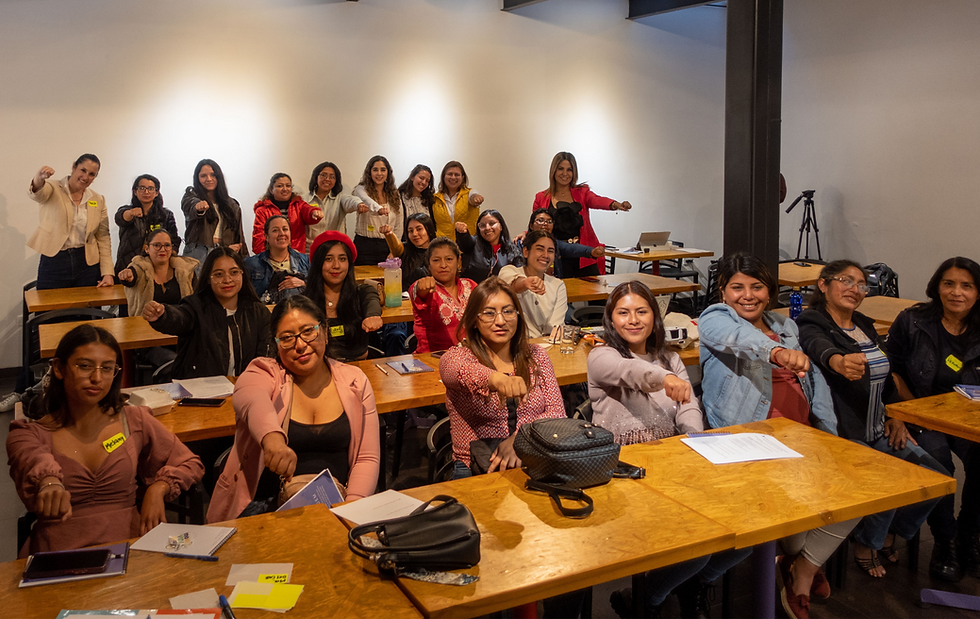Closing a chapter: E-Warmi’s journey towards gender-transformative e-mobility in Quito
- Thamires Pecis

- Oct 3, 2025
- 2 min read
Between February and September 2025, UEMI carried out E-Warmi, a UNEP- and BMZ-funded initiative under the Global Environment Facility (GEF). The project set out to show how the shift to electric mobility can be both just and gender-transformative.
If you are curious about where the project’s name comes from, here is an explanation. The word Warmi /'war.mi/ (guar-mi) comes from the Kichwa language and means woman; it symbolizes inclusion, strength, and leadership. By incorporating the prefix "e-," a connection is established with Ecuador, the country where the project is being developed, with electrification as the central axis of change.
At its core, E-Warmi was about creating opportunities for women in Quito to access the transport sector and to find their place in the growing e-mobility market.
Building alliances for change
From the start, E-Warmi was built on collaboration. The project brought together municipal institutions, private companies and civil society organisations:
Municipal Institutions: EPMTPQ and the Municipality of Quito
Private companies: Urbano Envíos, Grupo Entregas, DHL and BYD
Civil society organisations: Fundación Movidana, Mujeres Reales, Fundación Tándem, Fundación Red Sostenible and Carishinas en Bici.
These partnerships gave strength to the technical, logistical and communication sides of the project and ensured that women’s perspectives guided the proces.
Training and awareness
One of the central elements of E-Warmi was its training programme, designed to strengthen technical knowledge and build confidence among women interested in sustainable mobility. Forty women signed up, and 198 completed the full course, going well beyond the original target. They learned about electric vehicle components, safety and operations, and joined practical sessions with an electric bus, electric taxi and e-cargo bikes. The feedback spoke for itself, with an average evaluation of 4.83 out of 5, showing both high satisfaction and strong engagement.
As project coordinator, Alexandra Suasnavas underlined the importance of linking this kind of work to broader change:
“One of the key things I would like to highlight is how important it is, from a public policy perspective, to keep creating the right conditions for women to participate in the transport and logistics sectors. For example, designing a permanent training and practice program for women focused on passenger transport could be an excellent way to help them gain real experience and build the skills they need.”
Alongside the training, E-Warmi also amplified women’s voices through the campaign Voces que transforman la movilidad. The series featured short videos with interviews of women enrolled in the project, where they shared their experiences and perspectives on the role of women in mobility.
Voices that transform mobility
What truly marked the project were the personal journeys of the women who took part. Many spoke about E-Warmi as a turning point for their confidence, motivation and sense of belonging in the mobility sector. For some it meant overcoming the fear of driving, for others it was about connecting their professionais paths with the environmental benefits of electric mobility.
Reflecting on these stories, Alexandra Suasnavas said: “What I found especially meaningful was hearing the stories of women already making their way intothe sector—some as engineering students, others who have been working for years driving trucks, taxis, or school buses, and others who saw an opportunity and decided to obtain their professional licenses. For all of them, learning in depth about how electric mobility works was a unique chance, and having the opportunity to actually try out electric vehicles was without a doubt an invaluable experience.”
A lasting legacy
By the time E-Warmi came to a close, the project had engaged 12 women through in-depth interviews, worked with four civil society organisations, and delivered hands-on training with cargo-bikes, including sessions with women recyclers. More importantly, it laid the foundation for future collaboration with companies and institutions committed to advancing inclusive mobility.
For Alexandra Suasnavas, these results made one lesson especially clear:
“These stories have shown me that women not only have the skills but also the determination to take on any role or responsibility. Still, there are social challenges and barriers that continue to hold them back, and that is something we must keep working on together.”
E-Warmi showed that with the right support, it is possible to unlock potential, strengthen women’s leadership and bring diverse perspectives to the heart of electric mobility transitions. While the project has now concluded, the connections, experiences and lessons it created will continue to inspire more inclusive and low-carbon transport in Quito and beyond.
















Comments